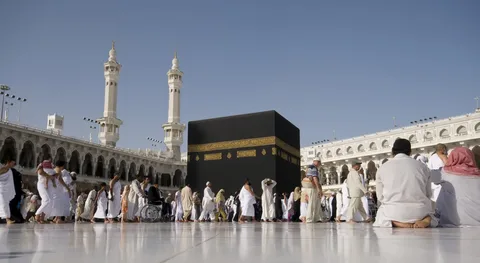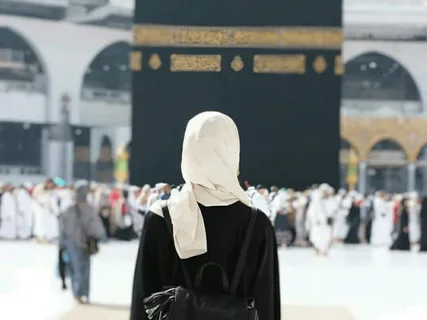Hajj, one of the five pillars of Islam, holds immense spiritual significance for Muslims worldwide. Each year, millions of Muslims from diverse backgrounds converge in Mecca, Saudi Arabia, to perform rituals that replicate the actions of the Prophet Muhammad and Abraham before him. in This article on Arabian Tongue website we will explores can a woman perform hajj alone in islam, delving into Islamic teachings, historical practices, and modern regulations.
Understanding Hajj

Hajj is not only a physical journey but a profound spiritual reawakening for Muslims. It involves several rituals, including Tawaf (circling the Kaaba), Sa’i (walking between Safa and Marwah), standing at Arafat, and more. The pilgrimage serves as a reminder of the unity and equality of all Muslims.
Historical Context
During the Prophet Muhammad’s time, Hajj was established as a key component of Islamic practice, with both men and women participating. Historical texts provide numerous instances of women performing Hajj with the early Muslim community, sometimes without a close male relative, or Mahram, in cases where safety was ensured by the collective.
The importance of hajj for women

Hajj holds profound significance for all Muslims, and its 5 importance of hajj for women is both spiritual and social, reflecting deep-rooted religious values and personal fulfillment. Here’s why Hajj is especially significant for women in Islam:
1. Spiritual Fulfillment
Hajj serves as a powerful spiritual journey that cleanses the soul of sins and renews one’s faith and dedication to God. For women, this pilgrimage is a profound opportunity to connect deeply with their faith, away from the distractions of daily life. The rituals of Hajj, which include circling the Kaaba, walking between Safa and Marwah, and standing on the plains of Arafat, offer moments of deep reflection and devotion.
2. Equal Obligations and Rewards
In Islam, women are equally obligated to perform Hajj as men, provided they meet certain conditions such as financial and physical capability and can ensure their safety during the journey. This equality in religious duties highlights the importance of women in the Islamic faith and underscores the belief that women and men receive the same spiritual rewards from God. Completing hajj definition merits facts is a significant achievement that elevates a believer’s status in the Islamic community and brings immense personal satisfaction.
3. Empowerment and Autonomy
Participating in Hajj can be particularly empowering for women. It allows them to make independent religious decisions and fulfill their Islamic duties directly. For many women, Hajj is an opportunity to assert their spiritual agency and experience a sense of autonomy that they may not commonly encounter in their daily lives.
4. Community and Solidarity
Hajj brings together Muslims from all over the world, creating a unique sense of global community and solidarity. For women, this experience is enriched by the presence of other female pilgrims from diverse backgrounds, sharing stories and experiences. It fosters a strong sense of sisterhood and mutual support, which can be especially uplifting and affirming.
5. Educational Opportunities
Hajj also serves as an educational journey where women can learn more about their religion, history, and the significance of the rituals they perform. This knowledge can be transformative, enhancing their understanding of Islam and their role within it. Moreover, the experience of Hajj often inspires women to take on greater leadership roles within their local communities, sharing the knowledge and spiritual insights they gained.
6. Reflection on Historical Figures
Hajj allows women to connect with important female figures in Islamic history, such as Hagar, who is commemorated in the ritual of Sa’i between Safa and Marwah. Reflecting on Hagar’s story of resilience and faith provides a source of inspiration and empowers women to embrace their strength and capability.
Role of Women in Hajj
Throughout Islamic history, women have actively participated in Hajj. Modern interpretations and regulations, however, often emphasize the need for a Mahram as a safeguarding measure, reflecting broader concerns about safety and social decorum.
Can a Woman Perform Hajj Alone?
Islamic scholars largely agree that a woman should be accompanied by a Mahram during Hajj to ensure her safety and compliance with Islamic teachings. However, interpretations can vary significantly among different schools of thought, with some offering flexibility under certain conditions.
Mahram: The Concept Explained
A Mahram refers to a male relative whom a woman cannot marry, such as a father, brother, or son. His presence during travel like Hajj is traditionally required to protect and assist the woman.
Hajj Without Mahram: Conditions and Exceptions
Scholars have debated conditions under which a woman could perform Hajj alone, such as in a safe and trustworthy group. In recent years, some authorities have relaxed these requirements, allowing women to perform Hajj in groups without a Mahram under specific circumstances.
Safety and Practicality
While the spiritual aspect of Hajj is paramount, practical considerations, particularly safety, are crucial. The Saudi government and various organizations have implemented measures to enhance the security and comfort of all pilgrims, including women traveling alone or in groups.
Legal Perspectives
Saudi law has traditionally stipulated that women must have a Mahram to perform Hajj. However, recent reforms have allowed women over a certain age to perform Hajj in groups without a Mahram, reflecting a significant shift in policy.
Advantages and Challenges
Performing Hajj without a Mahram presents both opportunities and challenges. The autonomy can be empowering, but the absence of a Mahram can also pose logistical and safety concerns.
Alternative Solutions
For women unable to find a Mahram, group pilgrimages organized by trusted agencies offer a viable alternative, combining safety with the fulfillment of religious obligations.
FAQs
Is it mandatory for a woman to have a Mahram for Hajj?
Yes, traditionally, it is mandatory for a woman to be accompanied by a Mahram when performing Hajj, according to the majority of Islamic scholars. This requirement is based on Hadiths that emphasize the safety and protection of women during travel. However, some recent interpretations and regulations allow exceptions under specific circumstances.
What are the conditions under which a woman can perform Hajj without a Mahram?
A woman may perform Hajj without a Mahram if she is traveling with a trustworthy and safe group. This is increasingly accepted in situations where the safety and security of the woman can be assured through the organization of the pilgrimage group. Some Islamic scholars and authorities also permit women over a certain age, typically 45 or older, to perform Hajj without a Mahram as part of an organized group.
How do group Hajj tours for women work?
Group Hajj tours for women are organized by licensed travel agencies that ensure all logistical and religious obligations are met. These tours often include female guides and provide comprehensive support throughout the pilgrimage. The groups are designed to ensure safety and compliance with Islamic laws, and they cater specifically to the needs of women performing Hajj without a Mahram.
What recent changes have been made to Saudi Hajj regulations regarding women?
Recently, the Saudi government has made significant changes to Hajj regulations, allowing women over the age of 45 to perform Hajj without a Mahram as part of an organized group. This reform aims to facilitate greater participation in Hajj and reflects a broader trend towards accommodating diverse needs and modern circumstances while maintaining religious integrity.
Can a woman perform all the rituals of Hajj alone if she travels without a Mahram?
Yes, a woman can perform all the rituals of Hajj alone if she travels as part of an approved group without a Mahram. The essential rituals of Hajj, such as Tawaf, Sa'i, and standing at Arafat, can be completed independently by women. The presence of a Mahram is traditionally required for the travel aspect rather than the performance of the rituals themselves.
Conclusion
The question of whether a woman can perform Hajj alone encompasses a range of theological, legal, and practical considerations. While traditional norms have generally required a Mahram, evolving interpretations and changing conditions are opening new possibilities for women’s participation in this pivotal Islamic rite.


